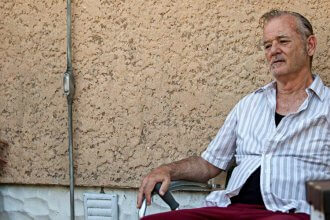
It’s hard to tie a day of True/False to one central theme. This year’s official festival theme is Out of the Ether because the lineup is dominated by films taking audiences out of their traditional surroundings, be they geographic or artistic. But the 4 films I viewed – I ended up skipping one because of technical delays to the schedule – will have their distinct differences, and tying each to the next can tend to feel like an overreach. I did start to see a thread stringing my Friday along: I was called to take on points-of-view different than my own.
In reality, empathy was the last thing I was thinking of after I left Manifesto (Grade: B-). An art installation turned feature, Manifesto lives up to its name, sewing together 13 vignettes carried by 13 distinct statements on art, society and how the two mingle. You might have heard of it if you’re deep into the film world: Cate Blanchett is the vessel for each of the main characters, and she does not disappoint… most of the time.
 I’ll admit, I struggled with Manifesto all day: I walked out of the theater disappointed, immediately messaging friends at the festival to steer clear. Yet when I ended up discussing it with my fiancée at length, I found it had inspired different reactions in us. While it came off to me as a snide, self-important work, she encouraged me to view it as a self-aware, tongue-in-cheek take down of arrogant artists. I didn’t take to the idea at first, but it did grow on me as the day went on. I’m still not convinced it was an effective film – the editor had to encourage the audience to not take it seriously – but I’ve warmed on it to the point where I would recommend at least one watch, if only for Blanchett.
I’ll admit, I struggled with Manifesto all day: I walked out of the theater disappointed, immediately messaging friends at the festival to steer clear. Yet when I ended up discussing it with my fiancée at length, I found it had inspired different reactions in us. While it came off to me as a snide, self-important work, she encouraged me to view it as a self-aware, tongue-in-cheek take down of arrogant artists. I didn’t take to the idea at first, but it did grow on me as the day went on. I’m still not convinced it was an effective film – the editor had to encourage the audience to not take it seriously – but I’ve warmed on it to the point where I would recommend at least one watch, if only for Blanchett.
Empathy wasn’t the emotion I was feeling after my second film either. On the contrary, Safari (Grade: A-) engendered feelings of righteous anger in me. Ulrich Seidl’s film takes audiences alongside wealthy Germans and Austrians being led on big-game hunts – targeting some majestic animals – in the plains of Africa. It’s a brutal look into a distinct sliver of human nature, but Seidl never uses his platform to condemn. Rather, he gives his subjects an honest chance to justify their actions. Whether or not those answers are satisfactory is left up to the audience, but Seidl doesn’t cut corners in portraying the raw violence these people bring to the region. And no, violence is not just physical in this manifestation. It has probably the slowest pace of all the films I’ve seen, but the silence and anticipation – described as just another thrill of the hunt – takes on new life in the eye of the camera. For a film so focused on death, it’s got a gruesome vitality to it.
Speaking of death, I was most emotionally involved in my third film of the day, Lindy Lou, Juror Number 2 (Grade: B+). Viewers are given a first-hand look into how capital punishment affects a group of jurors who sentence a man to death. At the center of the movie is Lindy Wells – her new surname is only credited, and I wasn’t able to track it down online – who is racked with guilt following the conviction, and ends up befriending the condemned man. A decade after his execution, Lindy sets off on a journey to meet up with her fellow jurors, looking for answers on how they’re coping with the decision all these years later.
Lindy Lou isn’t a technically perfect movie, but great films often use “weaknesses” to their advantage. In this case, director Florent Vassault builds a world as a warm as a bowl of grits and as familiar as your favorite armchair. It’s easy to get lost in the film, especially with a central character as charismatic as Lindy. It’s a quiet force, imbibing death with new meaning, specifically for those left in its wake.
Friday finished quite literally with a bang… or a series of bangs. Word had been spreading around the festival about the film focusing on a Mexican fireworks festival, and Brimstone & Glory (Grade: B) was Friday night’s hot ticket.
 For all the bluster, it doesn’t quite live up to the hype. It only runs about 70 minutes, but much of the first two-thirds of the film is spent on preparation work for the National Pyrotechnic Festival in Tultepec. It’s not as if the work is dull, but instead of committing fully to the visual nature of the work, director Viktor Jakovleski instead chooses to highlight characters who never truly get a full treatment.
For all the bluster, it doesn’t quite live up to the hype. It only runs about 70 minutes, but much of the first two-thirds of the film is spent on preparation work for the National Pyrotechnic Festival in Tultepec. It’s not as if the work is dull, but instead of committing fully to the visual nature of the work, director Viktor Jakovleski instead chooses to highlight characters who never truly get a full treatment.
But fireworks are all about the explosion, aren’t they? The movie’s fuse burns slow and dull, but once it gets going, it’s magnificent. I haven’t been treated to such a display of sight and sound in any past True/False screenings. Despite its plodding pace, Brimstone still manages to shine simply because the last 20 minutes make it all worth it.
For more coverage of True/False 2017 see the rest of the articles in this series: Preview, Day 1, Day 2, Day 3, Day 4.





